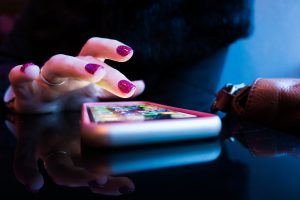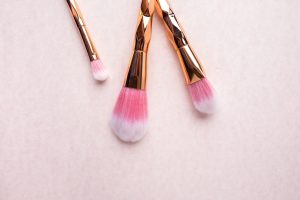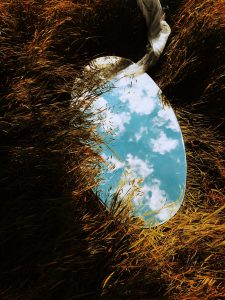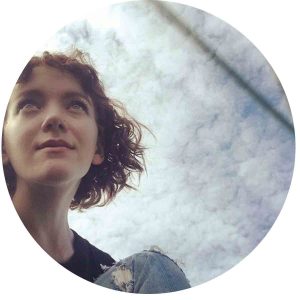[vc_row][vc_column][vc_column_text][printfriendly]
By Shaely Ritchey
The movie Eighth Grade by Bo Burnham is a modern day, coming of age story that focuses on a thirteen-year-old girl, growing up in today’s social-media obsessed and image-saturated world. Throughout the film, the main character Kaela spends an inordinate amount of time scrolling, liking, commenting, and incorporating the content she sees on social media, into her everyday life. Through the film we can see how social media influences the way this impressionable young person feels about herself and relates to her peers, in both positive and negative ways.
 Commentary on social media in the modern age and its potential effects on young people is not a new concern, but it is something that is important to continue exploring and reflecting upon, mostly for young people living the experience of growing up in our modern world. In particular, I want to focus on beauty culture, make-up, marketing strategies, social media and imagery, and how this can impact the way we think about ourselves – not as a criticism necessarily, just as a reflective and thought-provoking exercise.
Commentary on social media in the modern age and its potential effects on young people is not a new concern, but it is something that is important to continue exploring and reflecting upon, mostly for young people living the experience of growing up in our modern world. In particular, I want to focus on beauty culture, make-up, marketing strategies, social media and imagery, and how this can impact the way we think about ourselves – not as a criticism necessarily, just as a reflective and thought-provoking exercise.
Near the beginning of the film Eighth Grade, we see Kaela deeply absorbed in a make-up tutorial on YouTube, carefully following the steps outlined by a bright and spotless young Caucasian woman in a clean, well decorated room, using supplies that indicate money is not too much of a concern for her. This is a pretty standard example of a make-up tutorial on YouTube of which there are countless varieties, from every day looks, to more exploratory make-up, to topics for specific features and how to work with them, to reviews of products, and so forth. The artistry of some of these individuals is quite extraordinary and, in some ways, quite inspiring as they re-claim beauty and make-up to be a form of self-expression: something they do for themselves rather than for the sake of looking nice for others. This idea, make-up as artistry and self-expression, has been pretty revolutionary in recent years, especially as we see more men allowing themselves this form of self-expression and a move towards breaking free from rigid gender norms and a gender binary that doesn’t reflect the fluid nature of gender for many people. On the other side of things, beauty culture has been criticized as a form of vanity and a focus on outward appearance over other, more important, aspects of the self. I’m not saying either view is right or wrong, but I do think it is important to recognize that beauty culture is a multi-billion-dollar industry and like any industry, it adapts to market itself effectively even if that is under the guise of artistry and self-expression.
 Like Kaela watching YouTube tutorials, when you see a beauty “guru” guiding you through the steps of make-up application, they essentially paint a new face onto themselves, re-shaping features that are unique to them into a culturally decided-upon ideal. Some people will see this as enhancing the features one already possesses, but in some ways, beauty culture creates more conformity than it does artistry. We paint the same facial structures on widely different appearances that come from different ethnic backgrounds to some universal, arbitrary ideal which typically tends to emphasize Caucasian features (such as a narrow nose, wide eyes, sharply defined cheekbones.) This can be potentially harmful for anyone, but particularly people of colour who are already under-represented and faced with an onslaught of Caucasian beauty ideals (straight hair, light skin, etc.). Like a Snapchat filter that universally alters everyone’s features to suit a standard idea of beauty, make-up functions like a real-life filter. While there’s nothing inherently wrong with that as make-up can certainly allow people to feel more confident, more put-together, and allows them to explore their beauty in a new way, it’s also important to note how it makes one feel about their natural, unfiltered and unaltered features. This state of filtered “beauty” has become easily accessible, literally at our fingertips, and the issue is it can make one feel not good enough without it and alone with our flaws as every image we see is smoothed, plumped, and altered to fit the ideal. But every single person is “flawed,” and that’s part of what makes us who we are.
Like Kaela watching YouTube tutorials, when you see a beauty “guru” guiding you through the steps of make-up application, they essentially paint a new face onto themselves, re-shaping features that are unique to them into a culturally decided-upon ideal. Some people will see this as enhancing the features one already possesses, but in some ways, beauty culture creates more conformity than it does artistry. We paint the same facial structures on widely different appearances that come from different ethnic backgrounds to some universal, arbitrary ideal which typically tends to emphasize Caucasian features (such as a narrow nose, wide eyes, sharply defined cheekbones.) This can be potentially harmful for anyone, but particularly people of colour who are already under-represented and faced with an onslaught of Caucasian beauty ideals (straight hair, light skin, etc.). Like a Snapchat filter that universally alters everyone’s features to suit a standard idea of beauty, make-up functions like a real-life filter. While there’s nothing inherently wrong with that as make-up can certainly allow people to feel more confident, more put-together, and allows them to explore their beauty in a new way, it’s also important to note how it makes one feel about their natural, unfiltered and unaltered features. This state of filtered “beauty” has become easily accessible, literally at our fingertips, and the issue is it can make one feel not good enough without it and alone with our flaws as every image we see is smoothed, plumped, and altered to fit the ideal. But every single person is “flawed,” and that’s part of what makes us who we are.
Even the supposed counter-culture is more about conformity than it is individuality. For example, Instagram and its countless images of young women with bright blush, coloured hair, fake freckles, and supposed make-up and style that, on the surface of things, defies traditional expectations, but in essence follows the same pattern of conformity. Again, there’s nothing inherently wrong with this, and no one is a “bad” person for participating in perpetuating these ideals, it’s just important to look at how it makes one feel about themselves because it can lead to low self-esteem and to limited views of oneself as only being valuable if one looks a certain way when true value is far beyond appearance.
Social media is a small, often filtered and posed glimpse into what people want others to see about their lives. It often doesn’t showcase other aspects of life that are entirely normal like textured skin, self-doubt, or weight that doesn’t sit in areas we have decided are socially acceptable. Beyond that it is often image-based and unlike the old adage, a picture really isn’t worth a thousand words: it tells you very little about a person, their likes and dislikes, experiences, thoughts, hopes and dreams, potential, challenges in life, etc.
In many ways social media can also serve to de-humanize the very people that are in the photos, whether that is through make-up that creates similar facial features on different individuals until everyone looks exactly the same or the more sinister and body-focused accounts that very rarely even showcase a human face, but instead, focus on some part of the body posed in a very particular way. Pro eating disorder areas of the internet are extreme examples of the harm images can pose, and the limitation of a single image.

None of this is to sound like the older culture criticizing the younger culture for their social media obsessed ways (except when it comes to pro eating disorder content which is just straight up harmful). In terms of beauty culture, it is kind of wonderful that people are exploring learning to love themselves, to focus on themselves and seeing themselves as something beautiful rather than the idea that any focus on oneself is selfish which leads to its own issues. That said, it’s always important to reflect on whether you’re actually empowering yourself and learning to love yourself, or whether you’re being guided into the idea that you, as you are, are not good enough and that you need to change yourself in order to fit in. Remarkably, in Eighth Grade, a startlingly realistic movie about a young girl written and directed by a man, we end the film on a hopeful note as Kaela begins to develop a picture of her life outside of all the images she is surrounded by, telling her what that is supposed to look like and who she is supposed to be. The movie, and hopefully this post, can serve as an important reminder that we are flawed and that is okay, that social media is a limited representation of people, and that we are so much more beautiful and worth far much more than appearance. Remember, we’re not here to look beautiful, we’re here to live our lives in the various wonderful ways we can.[/vc_column_text][vc_empty_space][vc_separator][/vc_column][/vc_row][vc_row][vc_column][vc_empty_space][vc_column_text]

Shaely is a registered nurse with interest in further education in nursing or medicine. She is also a passionate mental health advocate in her community. In her spare time she loves taking photographs, getting outdoors, and petting as many dogs as she can.
[/vc_column_text][/vc_column][/vc_row]